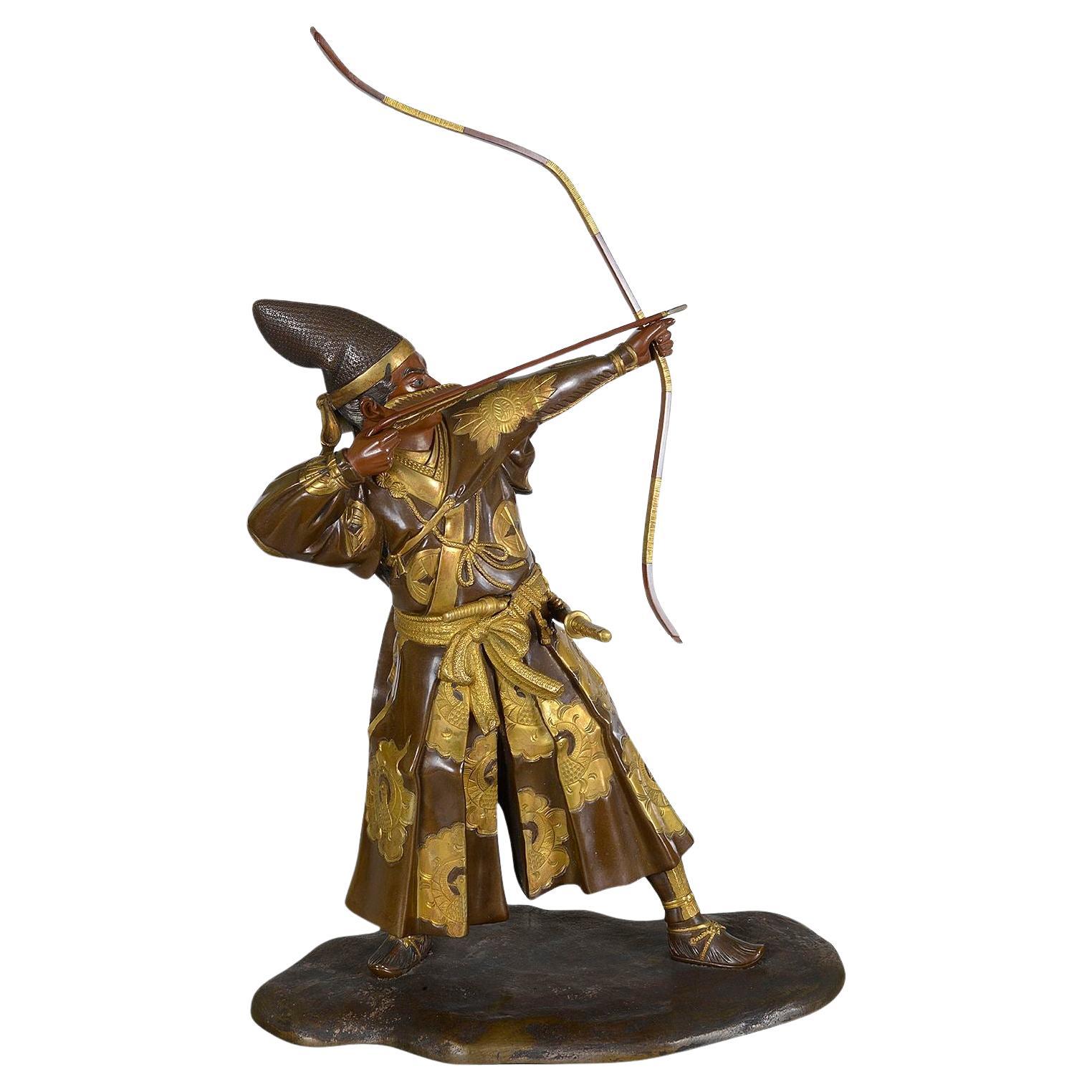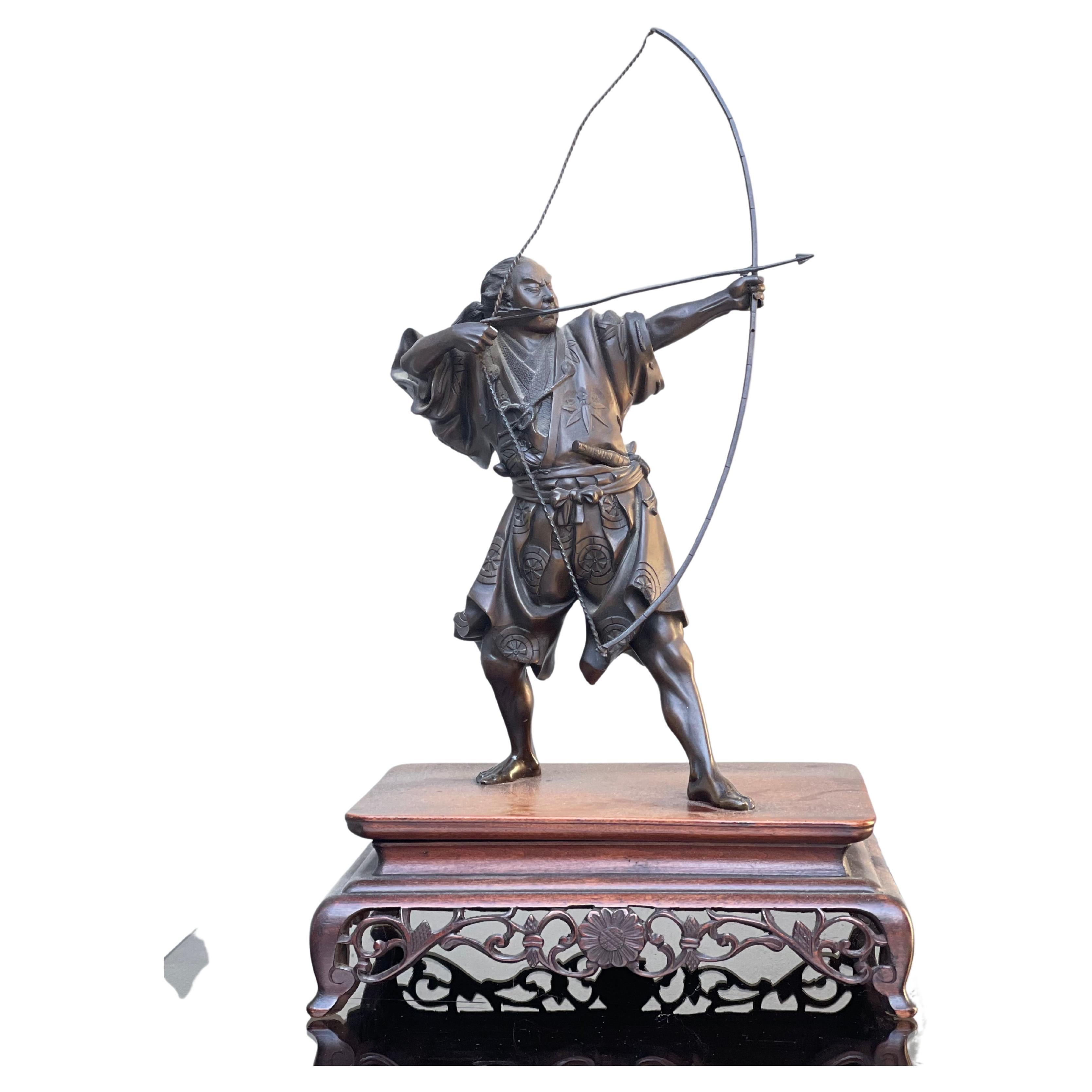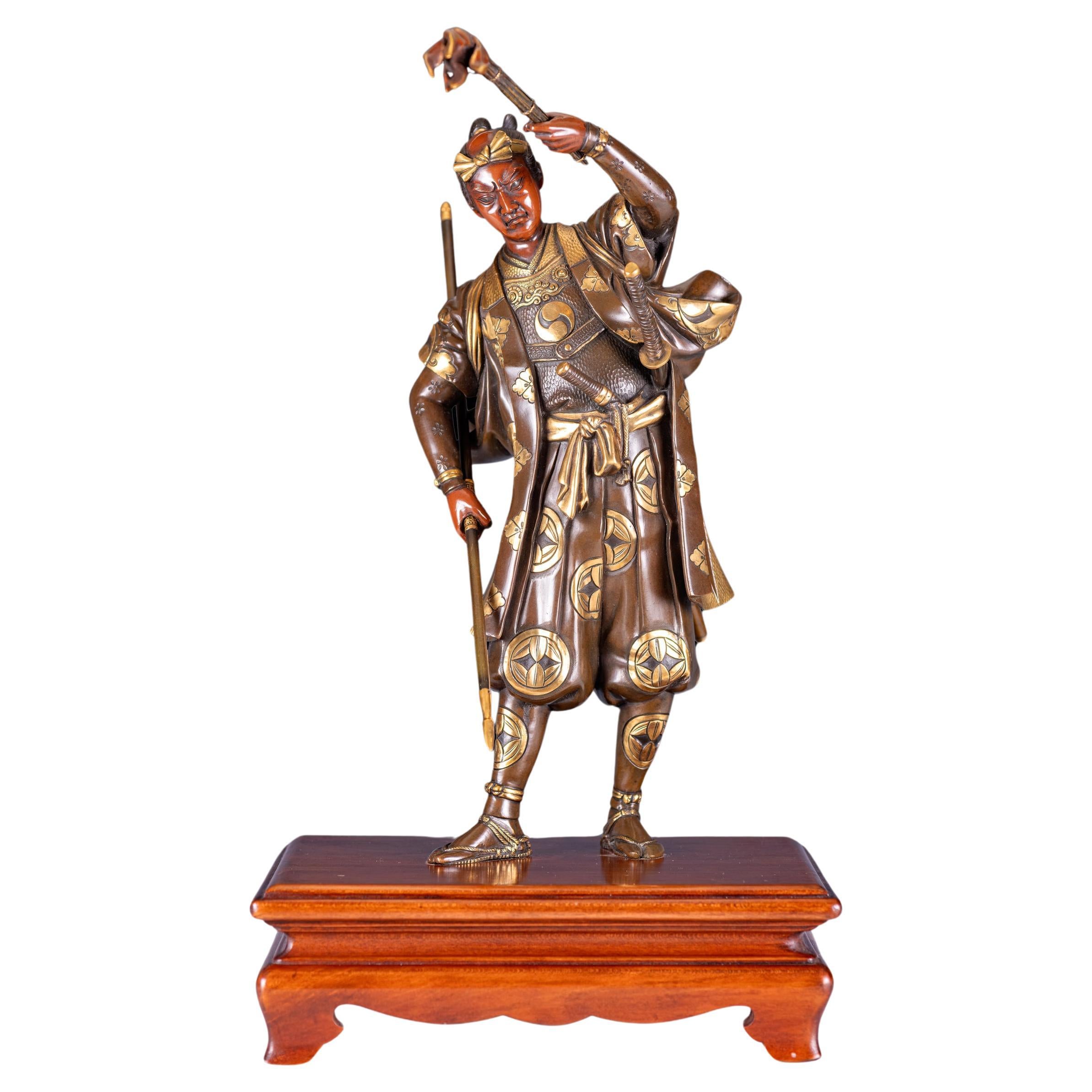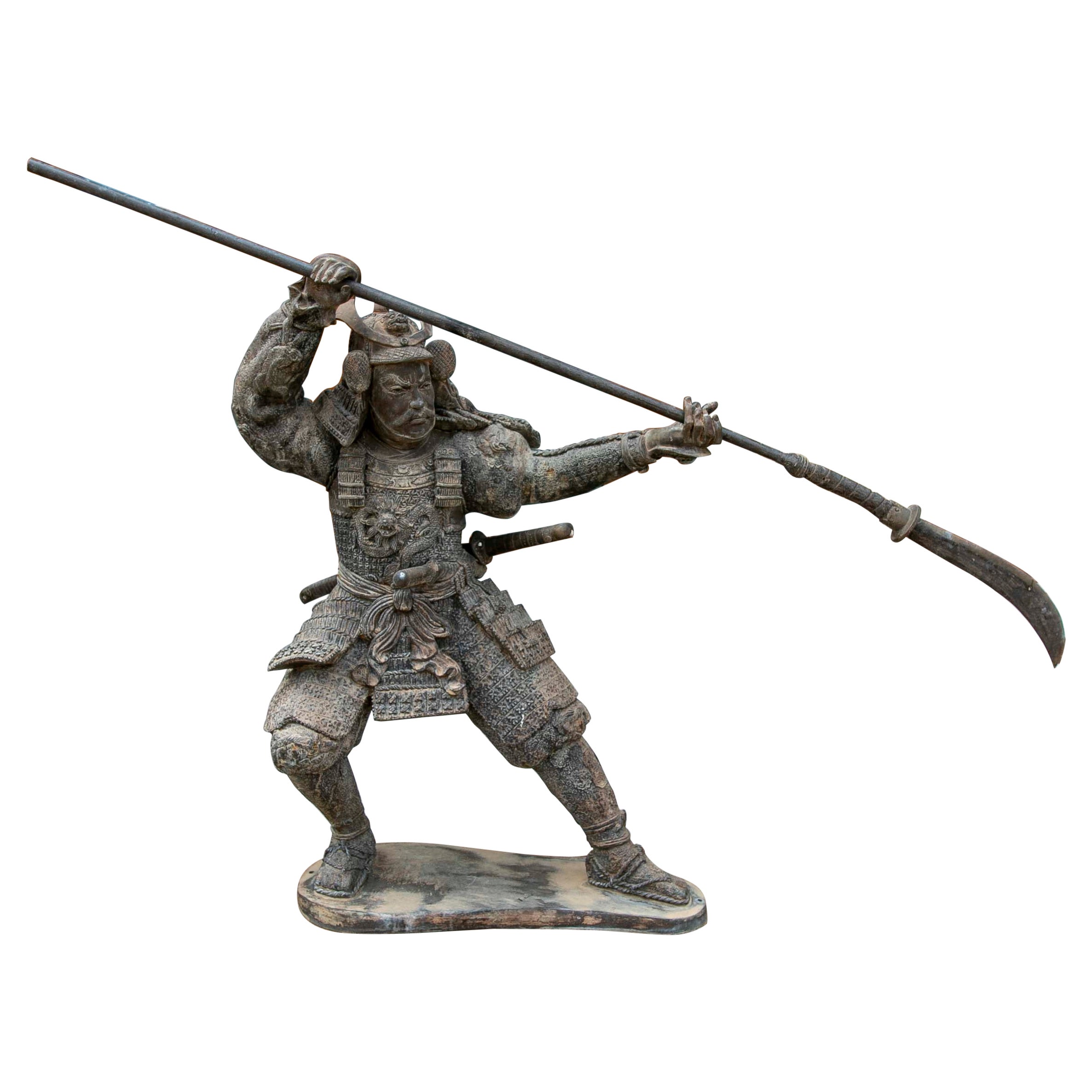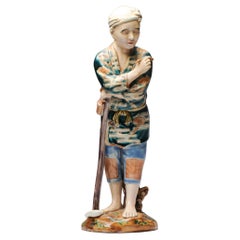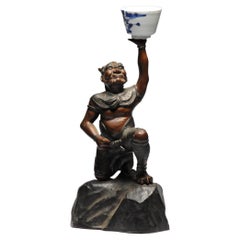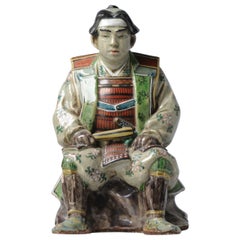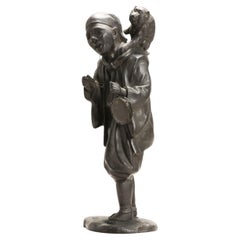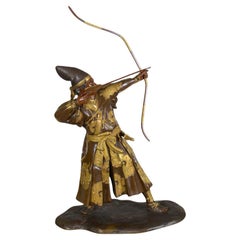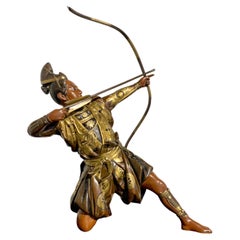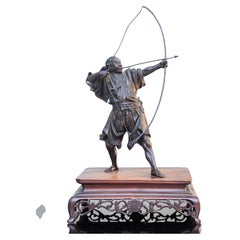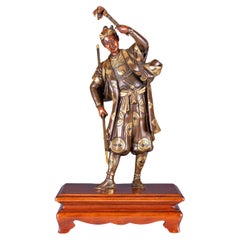Items Similar to Large Seiji Saku Bronze Archer Figure Statue Japan Meiji era (1868-1912)
Want more images or videos?
Request additional images or videos from the seller
1 of 21
Large Seiji Saku Bronze Archer Figure Statue Japan Meiji era (1868-1912)
$11,614.15
$14,517.6920% Off
£8,705.53
£10,881.9120% Off
€9,830.40
€12,28820% Off
CA$15,955.87
CA$19,944.8420% Off
A$17,813.23
A$22,266.5420% Off
CHF 9,333.86
CHF 11,667.3320% Off
MX$218,051.40
MX$272,564.2520% Off
NOK 118,540.16
NOK 148,175.2020% Off
SEK 111,768.32
SEK 139,710.4020% Off
DKK 74,832.59
DKK 93,540.7420% Off
Shipping
Retrieving quote...The 1stDibs Promise:
Authenticity Guarantee,
Money-Back Guarantee,
24-Hour Cancellation
About the Item
BRONZE ARCHER FIGURE Japan, Meiji Bronze period. H. ca. 38cm. The figure is kneeling, dressed in a haramaki and robes decorated with kamon and wheels, with a bow in his hands, signed on the reverse "Seiji saku". The figurine is mounted on a wooden base. With traces of age.
This is the rarer Large version of this beautifull statue
Meiji era (1868-1912), 19th century
Condition
Close to perfect condition, just some ware. 32x11.5x38CM LengthxWidexHeight (including base)
Period
19th century Meiji Periode (1867-1912)
- Dimensions:Height: 11.42 in (29 cm)Diameter: 0.04 in (1 mm)
- Style:Meiji (Of the Period)
- Materials and Techniques:
- Place of Origin:
- Period:
- Date of Manufacture:1870
- Condition:Minor losses.
- Seller Location:Amsterdam, NL
- Reference Number:1stDibs: LU4863239291012
About the Seller
5.0
Platinum Seller
Premium sellers with a 4.7+ rating and 24-hour response times
Established in 2015
1stDibs seller since 2019
264 sales on 1stDibs
Typical response time: 2 hours
- ShippingRetrieving quote...Shipping from: Amsterdam, Netherlands
- Return Policy
Authenticity Guarantee
In the unlikely event there’s an issue with an item’s authenticity, contact us within 1 year for a full refund. DetailsMoney-Back Guarantee
If your item is not as described, is damaged in transit, or does not arrive, contact us within 7 days for a full refund. Details24-Hour Cancellation
You have a 24-hour grace period in which to reconsider your purchase, with no questions asked.Vetted Professional Sellers
Our world-class sellers must adhere to strict standards for service and quality, maintaining the integrity of our listings.Price-Match Guarantee
If you find that a seller listed the same item for a lower price elsewhere, we’ll match it.Trusted Global Delivery
Our best-in-class carrier network provides specialized shipping options worldwide, including custom delivery.More From This Seller
View AllLarge Antique 19th-20th C Meiji Japanese Kutani Statue of a Man, Figure
Located in Amsterdam, Noord Holland
Description
A Japanese Kutani statue, Meiji period
Unmarked
Condition
Overall Condition small piece missing of the artifact held by the figure...
Category
Antique 19th Century Japanese Meiji Ceramics
Materials
Porcelain
$1,132 Sale Price
20% Off
Antique Okimono Bronze Japanese Statue Man Carrying Something Japan
Located in Amsterdam, Noord Holland
Description
Nicely made artifact of high quality. Basket is missing and we replaced it with a porcelain cup.
Condition
Overall Condition No real damages, just some ware. Size ...
Category
Antique 19th Century Japanese Meiji Ceramics
Materials
Bronze
$1,510 Sale Price
20% Off
Japanese Kutani Statues Story of Momotaro Tsugata Yuma, 19/20th C
Located in Amsterdam, Noord Holland
Large, lovely and very nicely made Kutani statues
They depict the characters from the story of Momotaro (Peach Boy). Specifically, Momotaro himself, Do...
Category
Antique 19th Century Japanese Figurative Sculptures
Materials
Porcelain
$2,398 Sale Price / set
20% Off
Antique Seiya-sei for Genryusai Seiya Bronze Man and Monkey Statue Japan Meij
Located in Amsterdam, Noord Holland
BRONZE Seiya-sei for Genryusai Seiya Man and Monkey figure. Marked on base
Meiji era (1868-1912), 19th century
Condition
Condition is Perfect: Size 33.5 cm high
Period
19th century ...
Category
Antique 19th Century Japanese Meiji Ceramics
Materials
Metal, Bronze
$4,998 Sale Price
20% Off
Antique Okimono Bronze Japanese Statue Man Carrying basket Japan
Located in Amsterdam, Noord Holland
Description
Nicely made artifact of high quality.
Condition
Overall Condition Just some ware and a small firing flaw to left robe, close to knee (a hole). Some chips/age crack...
Category
Antique 19th Century Japanese Meiji Ceramics
Materials
Bronze
$1,321 Sale Price
20% Off
Chinese Statue of a Figure by Shiwan Artist Feng Weimin Poem Liu Bang
Located in Amsterdam, Noord Holland
Chinese statue Made by the famous Shiwan Artist Feng Weimin. A poem by Liu Bang, the founding emperor of the Han Dynasty
“The wind is blowing and the clouds are flying,establish auth...
Category
21st Century and Contemporary Chinese Figurative Sculptures
Materials
Porcelain
You May Also Like
Japanese Miyao bronze warrior, 36cm high
By Eisuke Miyao 1
Located in Brighton, Sussex
A fine quality Japanese Meiji period bronze statue of a Samurai Warrior firing a bow and arrow. Having a wonderful patination and gilded highlights.
Batch 83 634230 SNKZZ
Category
Antique Late 19th Century Japanese Figurative Sculptures
Materials
Bronze
Japanese Miyao Style Gilt Bronze Samurai Archer, Meiji Period, Japan
By Eisuke Miyao 1
Located in Austin, TX
A spectacular Japanese cast, carved, and parcel gilt bronze sculpture, okimono, of a kneeling samurai archer, signed Kiyotsugu (died 1894), Meiji ...
Category
Antique Late 19th Century Japanese Meiji Sculptures and Carvings
Materials
Bronze
Scultura Bronzo Raffigurazione Arciere Periodo Meiji Firmata
By Saeki Yoshimitsu
Located in Milano, MI
Scultura Bronzo Raffigurazione Arciere periodo Meiji Firmata
Descrizione:
Scultura giapponese antica raffigurazione di arciere in bronzo realizzata...
Category
Antique Late 19th Century Asian Meiji Sculptures and Carvings
Materials
Bronze
Meiji Period Japanese Bronze Sculpture Of A Samurai Warrior By Yoshimitsu
Located in Dublin, IE
A superb Japanese bronze and gilded sculpture of a samurai warrior, Meiji period. Depicts a Japanese warrior in national dress and impetuous movement, the gilt details mon (heraldic ...
Category
Antique 19th Century Japanese Meiji Figurative Sculptures
Materials
Bronze
French Free Archer Bronze Statue After Pierre Tourgueneff
Located in New York, NY
Patinated bronze after Pierre Tourgueneff (1853-1912) depicting a medieval French free archer. 39 by 23.5 by 9.75 inches. With copper-brown patina and mounted on an oval marble pe...
Category
Mid-20th Century French Figurative Sculptures
Materials
Bronze
Bronze Sculpture of Samurai with Spear in Attacking Position
Located in Marbella, ES
Bronze Sculpture of Samurai with Spear in Attacking Position
Category
Late 20th Century Asian Figurative Sculptures
Materials
Bronze
More Ways To Browse
Large Bronze Statues
Gold Large Statue
Large Asian Statues
Antique Metal Statues
Meiji Figure
Large Antique Wheels
Figurines Japan
Antique Japanese Statues
Antique Metal Wheels
Antique Wooden Bow
Antique Bronze Ware
Bronze Archer
Japanese Bronze Figure
Antique Metal Figurines
1912 Antique Dress
Antique Statues Figurines And Statues
Japanese Bronze Statue
Metal Asian Statue
